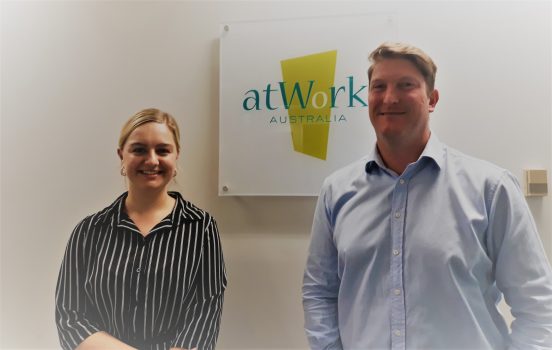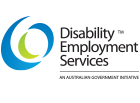
At aged 12, Amelia Cox was diagnosed with Limb Girdle Muscular Dystrophy, a progressive condition that involves the wasting of certain muscle groups. A client of atWork Australia 10 years later, Amelia shares her story, explaining the difficulties of living with an invisible disability and how she has overcome obstacles to find happiness in her employment.
“My life looks ‘pretty’ normal, I work, study and enjoy spending time with my friends and family, my disability is something that has and will always challenge me. Its effects change depending on the day and I am always learning how to best manage my symptoms. I often experience profound fatigue, that can be difficult to understand. Essentially, it means that I need to prioritise my health and monitor my energy levels so I don’t lose control, as becoming too fatigued is incredibly overwhelming and painful. My condition is fluid and thus unpredictable in nature, meaning, for example, I will range from feeling relatively fine one day to having to be in bed the next. Every day looks different for me, and can include extreme fatigue, tripping over, dropping things and struggling with any heavy lifting.”
Amelia’s disability is predominately invisible which can lead to a lack of understanding in and out of work.
“I think that while people have good intentions when it comes to invisible disability, there are many misconceptions. People with cognitive and/or physically hidden conditions experience this in different ways. The most common misunderstanding is that our disabilities ‘aren’t as bad’ and this insinuation can make us feel like frauds for claiming to share similar struggles with visibly disabled people. My condition on occasion has been minimised, mocked or entirely disregarded because my struggles are not always evident, ‘I just always forget’ has been said to me countless times. I have to explain my condition repeatedly to help people understand how my body works.
“Another misconception is that we don’t want to talk about disability, or that questions will upset us. Clearly, invisible disability is difficult to understand if it’s not your personal experience and I wouldn’t expect anyone to know how mine affects me, however I would rather someone ask as opposed to making assumptions. Conversations about disability can make people uncomfortable, therefore they will often choose to avoid it. While experiences of invisible disability vary greatly, the opinion of those of us with one is generally that people can’t know what we’re going through if they don’t ask.”
This sense of taboo has, in the past, affected Amelia’s job search and the matter of disclosing her disability to a potential employer was a difficult matter for her to approach. Due to the fear of discrimination and social stigma, many prospective employees who have a hidden disability, may choose not to disclose it when applying for new jobs.
“I think the hardest thing about finding employment was knowing how and when to disclose my disability to a potential employer. I’ve generally felt comfortable enough to discuss my condition as it’s a big part of who I am and how I live my life. However, I find that many people don’t ask questions, so that can make it more difficult to talk about and articulating my condition as it’s complex and contradicts my appearance.”
Amelia, who found work as a Junior Administrator through atWork Australia, urges those with an invisible disability to feel confident in their ability to be transparent with potential employers.
“Society’s perception of disability is still quite negative and is often portrayed as something to be fixed. atWork Australia has never made me feel like that. They were able to assist me in speaking to my employer about my disability and since finding employment, they have remained in contact with me regularly, which I really appreciate. I know that if my situation changes, or if I experience a challenge at work, they will be there with the appropriate resources and support.
“People living with disabilities derive no less purpose and fulfilment from their work and I think it’s paramount that they collaborate with workplaces to create spaces that are free from misconception by having conversations about disability.”
For more information, please visit https://www.atworkaustralia.com.au/des


